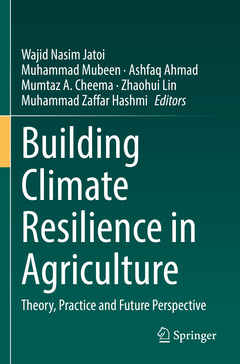Building Climate Resilience in Agriculture, 1st ed. 2022 Theory, Practice and Future Perspective
Coordonnateurs : Jatoi Wajid Nasim, Mubeen Muhammad, Ahmad Ashfaq, Cheema Mumtaz Akhtar, Lin Zhaohui, Hashmi Muhammad Zaffar

Dr. Wajid Nasim Jatoi is working as Associate Professor in the Department of Agronomy, Faculty of Agriculture and Environment, The Islamia University of Bahawalpur (IUB), Bahawalpur, Pakistan. He has also served Department of Environmental Sciences, COMSATS University Islamabad, Vehari Campus, Pakistan for about 7 years including his service as Head of the Department. DR. Wajid has vast experience of almost 13 years in the field of Climate Change and Crop Simulation Modeling. He is PI or Co-PI in at least 7 national and international projects related to crop simulation modeling which have either been completed or in progress. He has more than 50 international publications in the relevant field. The title of his PhD research was “Modeling the impact of climate change on nitrogen use efficiency in sunflower (Helianthus annuus L.) under different agro-climatic conditions of Punjab-Pakistan”. He has also completed his two Post-Doctorates from Centre International de Hautes Etudes Agronomiques Mediterraneennes (CIHEAM)-Institut Agronomique Méditerranéen de Montpellier, France and Commonwealth Scientific and Industrial Research Organization (CSIRO), Ecosystems Sciences and Sustainable Agriculture Flagship.
Dr. Muhammad Mubeen has been working as Assistant Professor in Department of Environmental Sciences, COMSATS University Islamabad, Vehari Campus, Pakistan since 2014. He has an ample background in the related field. He was awarded HEC Indigenous Scholarship to complete his PhD, the title of which was “Simulating the effect of different irrigation regimes on autumn-sown maize using CSM- CERES-Maize model”. He has published about 50 research papers in relevant fields in national and international journals. He is PI and Co-PI in at least 8 national and international projects (relevant to Climate Change and Crop Simulation Modeling) which are either completed, in progress or submitted.
Prof. Dr. Ashf
Date de parution : 10-2022
Ouvrage de 413 p.
15.5x23.5 cm
Date de parution : 10-2021
Ouvrage de 413 p.
15.5x23.5 cm
